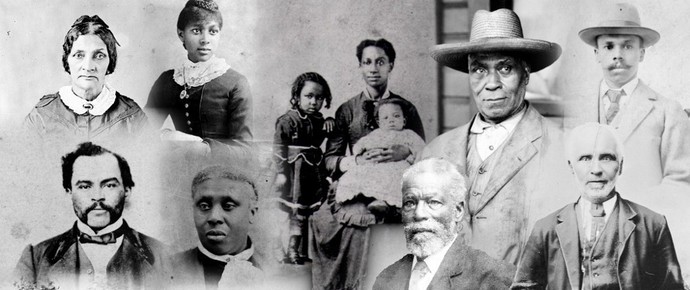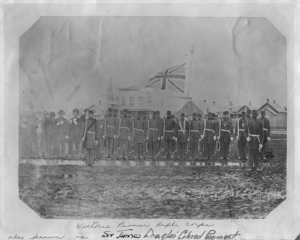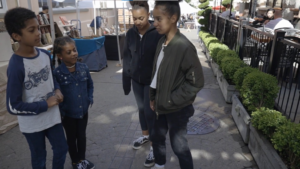This blog post was written by Fran Morrison – Board Secretary, BC Black History Awareness Society.
Our Story Begins in 1858. 164 years ago, a group of about 800 Black settlers, invited by the governor of the British colony, journeyed to British Columbia. The BC Black History Awareness Society (BCBHAS) has created an online exhibit to share their stories and describe the influence that they and their families had on the province’s historical development and diversity. The exhibit, which officially opened in December 2020, is hosted by Digital Museums Canada.
British Columbia’s Black Pioneers is a collection of short stories about women, men, families, and partnerships that show the intricacies of the events, experiences, and circumstances of everyday life of the Black pioneers, such as winning prizes at the earliest Saanich Fair in 1875, organizing by women in Victoria to raise money to support Black troops in the American Civil War, and confronting discrimination while still achieving many “firsts” in business, politics, and education.

The histories of Mifflin Wistar Gibbs, Emma Stark, and William Allen Jones are among the fascinating stories in the exhibit that are often left out of Canadian History. Here is just a small sample of what you’ll learn from the exhibit:
Mifflin Wistar Gibbs was the de facto leader of the Vancouver Island Black community. He was a lawyer, legislator, judge, diplomat, and businessman. In 1866, Gibbs became the first Black person elected to public office as a Victoria City Councillor. In 1868 he was a delegate at the convention to draw up the terms for B.C.’s entry into Confederation.
Emma Stark was four years old when her family arrived with the pioneers. At the age of 18, she was hired to teach in a one-room school, becoming the first Black teacher on Vancouver Island. On weekends Emma rode home on the horseback or in a homemade sleigh pulled by oxen. Her starting salary was $40 a month. There were only 32 public school teachers in BC at this time.
William Allen Jones was the oldest of three pioneer brothers. He and his youngest brother joined the excitement of the gold rush in Barkerville, while the middle brother remained on Salt Spring Island as a schoolteacher. Nicknamed “Painless Jones”, William Allen, became the first dentist to be granted a license under the British Columbia Dental Act.
The story and history of these Black settlers is an important part of understanding Canada’s multicultural society. Canadians are generally taught that Black people came to Canada to seek relief from the oppression of slavery or, more recently, from repressive socio-economic conditions in their home countries. These stories help round out the picture of Canada by showing how this group of free men and women contributed to the richness of the new, emerging society in the west and were an integral part of its early formation. Knowing the full history of the roles Black people played in the development of Canada results in a better understanding of the advantages of multiculturalism today. As schools are increasingly relying on digital mediums to enhance their curriculum, connecting Black youth to stories of inspiring past achievements results in far-reaching positive outcomes. The Government of Canada recognizes the utility of making these stories available and lists this exhibit as an educational resource on their information page about Canadian Black History Organizations.

Check Out the Story of the Black Pioneers for Yourself. This virtual portrayal of BC’s Black Pioneers is a permanent exhibit with no current end date. It features 20 stories with 86 historical images as well as interesting archival documents and materials. Many stories have accompanying videos shot specifically for the exhibit with narration by members of our Society and people who have a direct connection to the pioneer story. Plus, the entire exhibit can be accessed in French, as our last census shows 28% of Black Canadian families speak French at home [Diversity of the Black population in Canada: An overview, StatsCan 2019].Learn about the past in either language – the stories, gallery, descriptions, alternative (alt) text, descriptive video transcripts, and closed captions. Everything. This is a Canadian story for everyone.
Viewers enter an informal learning environment that is engaging for people of almost any age. Viewers have complete control over the experience. You can spend your time watching and reading the stories the way you want, when you want, by yourself or together with your family or friends. You can create your own unique experiences, discover what’s meaningful for you and acquire information that interests you.

Ready to take a look? You can start exploring the exhibit on BC’s Black Pioneers here.
We Live BC Black History. The BC Black History Awareness Society was founded in 1994 and is based in Victoria, BC. Our members are devoted to creating an awareness of the history of peoples of African descent in BC and celebrating their historical and contemporary contributions and achievements. We invite you to explore our website and its extensive Learning Centre. And, if you decide while you visit that you want to donate to help us continue our work, that’s great, too.
In addition to promoting education on Black heritage and culture, we have taken an active role in using history as a tool to combat racism. We recently partnered with the Royal BC Museum to prepare a physical exhibit called “Hope Meets Action: Echoes Through the Black Continuum” that runs through March 2022. Written, told and designed by Black voices, Hope Meets Action reclaims and retells the complicated history of stolen people on stolen land, and how the contributions of Black leaders echo across the centuries into the present.
We hope that everyone will use Black History Month 2022 as a jumping off point to learn more about the diversity of stories of Black people in Canada.
Leave a Reply